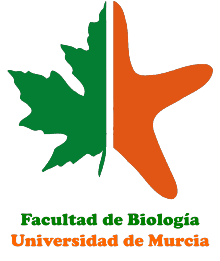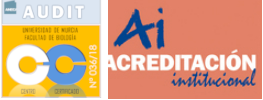Brief History
The faculty of Biology of the University of Murcia teaches Biology, Environmental Sciences and Biotechnology all to degree level. Biology teaching began in 1975, while Environmental Sciences dates from 2000 and Biotechnology from 2009. The teaching is very intensive and a substantial number of graduates have been educated, many of them also following postgraduate and PhD studies.
The offer for postgraduate studies includes the following Master and Doctoral courses: "Management of Fishery and Aquacultural Resources", "Molecular Biology and Biotechnology", "Forensic Sciences", "Water Technology, Administration and Management", "Protected Areas, Natural Resources and Biodiveristy", "Biotechnology and the Biology of Stress in Plants" and "Bioinformatics". Such studies are based on the wide-ranging research work carried out in the Faculty of Biology, public concern, and the demand for academic titles both within Spain and from abroad.
The Faculty of Biology also imparts courses at the Universidad Internacional del Mar (International University of the Sea), which is organised during the summer months in the Autonomous community of Murcia.
The quality of the degree, postgraduate and doctoral courses approved by the responsible national agency (ANECA), while the teaching quality is overseen by the Quality Guarantee System of the University of Murcia.
The research carried out in the faculty is recognised at regional, national and international levels for its innovation and high scientific content. This is demonstrated by the wealth of publications in journals of worldwide repute and is financed by regional, national and international projects and collaborative ventures with private companies in a variety of fields. The research is carried out in the specialist laboratories of the FOB, in several buildings that the University of Murcia has constructed to support scientific research, and in laboratories in many countries of the world through mobility and cooperation programmes, especially within European and American universities.
Most graduates find work as professionals within the province, in the rest of Spain or in other countries, since they are considered capable of covering the needs of a modern society open to novel methods and scientific discovery.
In both their teaching and research roles, the teaching staff carries out its work with integrity and dynamism. The teaching is adapting itself to pan-European models, while a detailed analysis of the same can be found in the course guides available at "Studies" on this web page. The tasks carried out by the FOB are based on an infrastructure suited to the professional needs of a modern university, and are made possible by the dedicated efforts of Auxiliary and Service Personnel of the University of Murcia, who ensure that the faculty runs smoothly.
Teaching staff, auxiliary personnel and students can all take advantage of the mobility programmes established to impart academic and training courses in other universities through the different programmes available, including Erasmus, Erasmus-Mundus, Sicue, ILA and ISEP, which permit exchanges with Spanish, Latin American, North American and Asian universities. To the personal advantages involved must be added the role of exchange students as ambassadors of our faculty and university, which are becoming increasingly known outside the confines of Spain. The cultural, technical and scientific benefits need no explanation.
The students of the FOB and the university in general have the possibility to carry out practical stays in universities and health science-related centres through the COIE and practical-Erasmus and Leonardo da Vinci programmes.
The FOB edits the scientific journal "Anales de Biología•, which has a wide circulation, especially in Latin America, but also in other European countries, North America and Asia. The faculty also collaborates in the journal Eubacteria published by the Oficina Verde and entirely managed by students. The FOB organises an annual activity, educational and amusing at the same time but of scientific importance – the Semana de Biología (Biology Week). This has firmly taken root in the province and we recently celebrated the XXV edition of the same. During this week, the faculty opens its doors to secondary students and organises activities that bring students and teachers together outside their normal academic environment. The following bodies collaborate in this event: the Colegio Oficial de Biólogos de la Región de Murcia (COBRM), Asociación Murciana de Estudiantes y Licenciados en Ciencias Ambientales (AMELCA) and the Oficina Verde. The FOB counts among its installations the natural history museum, "Museo de Historia Natural José Loustau" in which the visitor can inspect teaching materials and instruments from the XIX and XX centurial, along with a splendid collection of biological models that have been used by students at the University of Murcia since its inception
The FOB participates in organising the regional stage of the "Biology Olympics" which is aimed at 16-17 year old pupils interested in Biology, the three best classified taking part in the national stage of the same event.
In the different sections of this webpage, the user can find more detailed information on all these aspects and many more which, we hope, will be found interesting. I hope we shall see you here one day. In the mean time, please receive a cordial greeting.







